 Petzlover
Petzlover Chartreux is originated from France but Siamese is originated from Thailand. Both Chartreux and Siamese are having almost same weight. Chartreux may live 5 years less than Siamese. Both Chartreux and Siamese has same litter size. Chartreux requires Moderate Maintenance. But Siamese requires Low Maintenance
Chartreux is originated from France but Siamese is originated from Thailand. Both Chartreux and Siamese are having almost same weight. Chartreux may live 5 years less than Siamese. Both Chartreux and Siamese has same litter size. Chartreux requires Moderate Maintenance. But Siamese requires Low Maintenance
 Hailing from France, the Chartreux cat is a rare cat breed but is still recognized by a number of cat registries around the world.
Hailing from France, the Chartreux cat is a rare cat breed but is still recognized by a number of cat registries around the world.
It’s not a new breed of cat, and in fact, the Chartreux is mentioned for the first time in 1558 in a poem and later on in paintings. There are quite a few legends as to the origins of the Chartreux and while some believe that the cats were brought to France by monks others believe that the Chartreux's ancestors were feral mountain cats from Syria.
European breeders kept the breed from extinction, especially after the 2nd world war, and the first Chartreux were brought to the United States in 1971. In 1987 the Cat Fancier’s Asociation advanced the Chartreux breed to championship status.
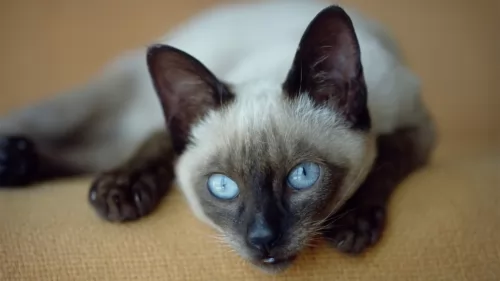 The Siamese cat is one of the most recognized cat breeds there are. The cat hails from Thailand and is the foundation stock for a number of other breeds.
The Siamese cat is one of the most recognized cat breeds there are. The cat hails from Thailand and is the foundation stock for a number of other breeds.
It comes in two distinct variations - traditional and the more modern Siamese.
In the United States, most of the top cat registries only consider the 4 original fur colors as Siamese – chocolate point, seal point, blue point, and lilac point.
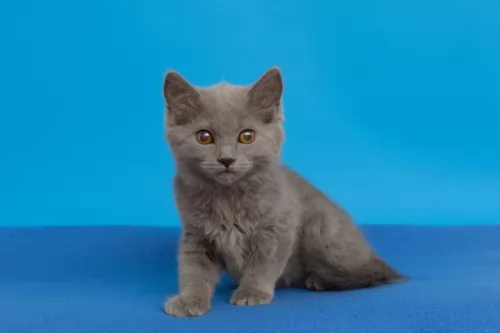 The Chartreux is a large, strong, stocky, muscular cat that can weigh anything between 4 to 7kg while some can weigh as much as 9kg.
The Chartreux is a large, strong, stocky, muscular cat that can weigh anything between 4 to 7kg while some can weigh as much as 9kg.
He has short legs when compared to the large body. He is known for his blue-like, silver-gray coat. In fact, the color can be any shade in the region of blue-grey. The coat is short, dense and double-coated and he has gold or copper-colored eyes.
People who have owned these cats say that they can take 3 to 4 years to reach maturity. Some people get mixed up and think this cat is very similar to the British Blue but they are two different breeds altogether.
The Chartreux is a real lap-cat just loving being able to settle down into his human owner's lap. It’s a cat with a 'smiling’ face because of the structure of his muzzle.
He is a very affectionate cat and will follow his people much like a dog. He is very intelligent and quiet and adapts well to a new situation. It's a cat that loves to climb so you will need to invest in a climbing tree for him as well as a scratching pole.
He is a good cat for first-time cat owners as well as being a good friend in homes with well brought up children. He is able to be friendly with other pets in the house.
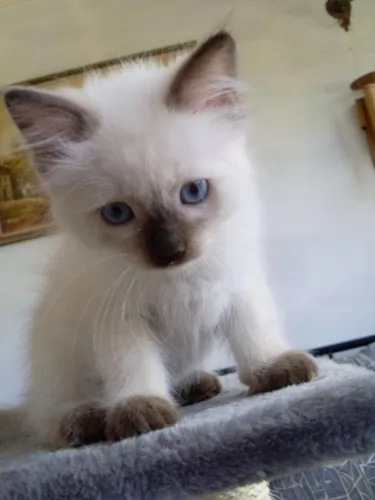 The Siamese cat is a medium-sized cat. Today’s Siamese cat is recognized by the triangular-shaped head, the slender, muscular body, the blue almond-shaped eyes, the largish ears, and the cream point colored coat.
The Siamese cat is a medium-sized cat. Today’s Siamese cat is recognized by the triangular-shaped head, the slender, muscular body, the blue almond-shaped eyes, the largish ears, and the cream point colored coat.
The face of the Siamese also has a mask of the same point color. Weighing at between 3 – 5kg, the Siamese has a long neck and slender tail.
All Siamese kittens are cream or white at birth, but they develop visible points in the first few months of life. The coat is short and glossy. By the time the kitten is 4 weeks old, the points are clearly distinguishable.
Siamese are affectionate, curious, playful, intelligent cats and are known for their vocal, social natures.
With the Siamese cat, you may see him bonding strongly with one particular person in the family.
They’re active cats and are also one of these cat breeds that are described as being more dog-like. Some of them become so attached to their human owners that they can become depressed or suffer from separation anxiety when left alone for long periods of time.
Because of the cat’s intelligence, he can be easily trained to respond to simple commands.
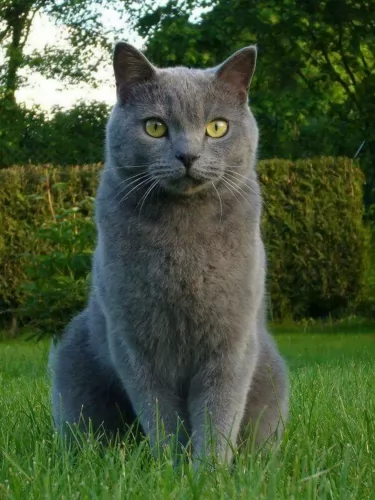 Although this is a large, strong cat, he is actually a gentle feline in nature and he doesn’t like being part of any bickering among his human family, preferring to run away. He also doesn’t like being spoken harshly to when he has done something wrong.
Although this is a large, strong cat, he is actually a gentle feline in nature and he doesn’t like being part of any bickering among his human family, preferring to run away. He also doesn’t like being spoken harshly to when he has done something wrong.
This cat isn’t an extrovert by any means but he isn’t particularly shy either and enjoys spending time with his human family.
He isn’t a demanding cat but is easy-going, just wanting to get on in life and he promises to make you a steady, loyal companion.
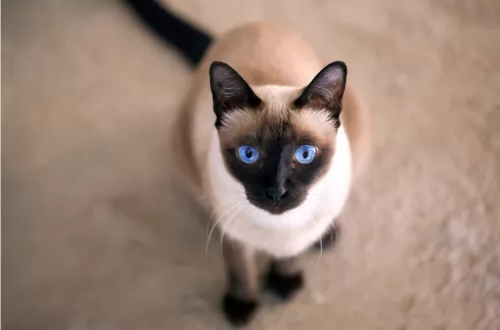 The Siamese cat is such a popular breed and with good reason. It makes a splendid companion for single people, families, couples, and older people. It gets on well with children and other pets too.
The Siamese cat is such a popular breed and with good reason. It makes a splendid companion for single people, families, couples, and older people. It gets on well with children and other pets too.
However, it is an energetic cat and won’t relish lying around day after day. He will want you to play with him and exercise him too, providing him with a stimulating environment.
These are such affectionate cats too, that it will be too sad if he lands up in a home where people don’t provide him with love and care. In exchange for that, you couldn’t ask for a better companion and friend.
 These cats are particularly prone to dental problems. The reason for this is that their incisors are closely set together and small.
These cats are particularly prone to dental problems. The reason for this is that their incisors are closely set together and small.
Because of the heaviness of this cat, the Chartreux is also prone to a disease known as patellar luxation or kneecap displacement. This problem can eventually lead to lameness. One way to avoid this particular problem is to rather get your kittens from reputable breeders.
These cats are much inclined towards weightiness so you have to be watching his diet carefully, more so because the cat is prone to patellar luxation.
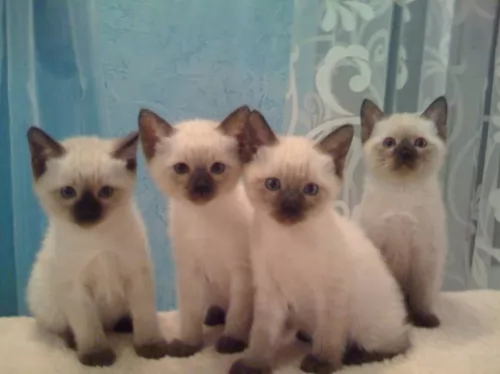 With good care, your Siamese cat can live to be between 12 and 20 years of age. It is a slim cat, so you want to keep him that way as becoming overweight can put a whole lot of pressure on the cat’s joints and bring on other health issues.
With good care, your Siamese cat can live to be between 12 and 20 years of age. It is a slim cat, so you want to keep him that way as becoming overweight can put a whole lot of pressure on the cat’s joints and bring on other health issues.
There are always some common cat diseases to watch out for and one of these is mammary tumors. They also battle with gastrointestinal problems and lung infections.
They are actually prone to respiratory problems, but this is more seen in younger cats. Upper respiratory infection with the Siamese cat will usually last about a week or it can go on longer.
Your cat with have a nasal or eye discharge, will be drooling as well as have ulcers around the nose and mouth with aches and pains aa well as lethargy.
Make sure that your Siamese cat is up to date with his vaccinations.
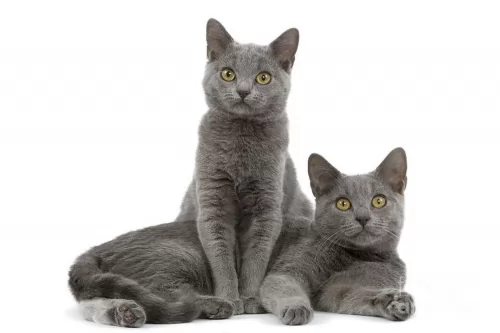 Your Chartreux cat’s dense, double coat will require brushing once or twice a week, especially in the cat’s seasonal shedding period.
Your Chartreux cat’s dense, double coat will require brushing once or twice a week, especially in the cat’s seasonal shedding period.
This cat doesn't take well to changes in his diet, particularly when he finds a type of food that he likes, then he wants to stick to that. You want to feed your cat a top-quality food to encourage good health but you want to avoid overfeeding as obesity in cats comes with lots of problems. A cat is a carnivore and you therefore need to feed your cat a diet rich in protein. Speak to your vet or another cat expert who can advise you on feeding your cat if you are in any kind of doubt. Make sure your kitty kat has a never-ending supply of fresh, cool water.
Always make a point of checking inside your cat's ears as well as inside his mouth for bad teeth. Bad teeth can cause terrible pain and your pet has no way of communicating this to you.
Have your cat neutered or spayed if you don't want your cat to have kittens.
 Good diet is one of the most important ways to care for your Siamese cat. Your cat is a carnivore and you therefore need to ensure he gets an appropriate diet otherwise you’re going to be spending more time at the vet with a sick cat than you’d like to.
Good diet is one of the most important ways to care for your Siamese cat. Your cat is a carnivore and you therefore need to ensure he gets an appropriate diet otherwise you’re going to be spending more time at the vet with a sick cat than you’d like to.
Always check with your vet if you have any uncertainties about feeding your Siamese kitten. Kittens will eat different food to an adult, and even in adulthood, there is commercial cat food manufactured for adult cats, pregnant felines, lactating cats, energetic cats, senior cats and sick cats.
Where possible, you will need to try and provide your cat with some fresh, raw meat too.
Never leave your cat without a bowl of fresh, cool water night and day.
The coat of the Siamese cat is thick, soft, and silky and he will require a brush every week to keep it like that.
They are agile, athletic cats, loving to jump up onto perches so it will be a good idea to provide a climbing tree or some other equipment where the cat can leap up onto.
Provide your cat with a litter box and make sure that the cat’s feces are removed every single day.